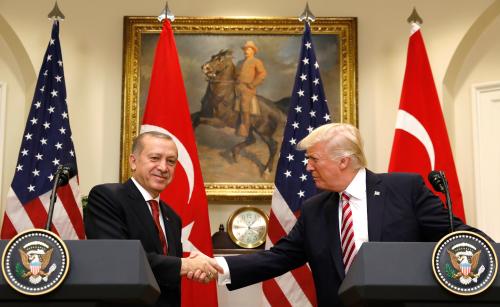Last Sunday’s elections in Hungary and Poland gave democrats in Central Europe new cause for hope, as the ruling right-wing nationalist parties in both countries suffered setbacks at the polls. In Hungary’s municipal elections, a unified opposition defeated autocratic Prime Minister Viktor Orbán’s Fidesz in the capital of Budapest and a series of regional administrative capitals. In Poland, the ruling Law and Justice Party (PiS) narrowly lost control of the country’s Senate to a collection of opposition parties.
Thirty years after Central Europe celebrated the end of communism, Sunday’s elections point to cracks in the region’s “illiberal” democracies, a brand of governance coined by Orbán that has shrunk the space for civil society, free media, and opposition parties in both countries. While Fidesz and PiS will continue to be the dominant parties in their respective countries — for now — opposition parties have won important platforms to act as a check on ruling-party power and further unify democratic forces.
Hungary: Opposition takes Budapest, makes inroads in the countryside
In Hungary, the biggest and most symbolic victory came in Budapest, where the 44-year-old liberal Gergely Karácsony unseated the incumbent mayor allied with Orbán. In winning a majority in the Budapest assembly and self-governing districts, the opposition took control of Hungary’s political, cultural, and economic center, which houses a third of its population, for the first time since 2006. The opposition also more than tripled its tally of regional city halls from three to 10 (out of 23 total), exposing signs of weakness in Fidesz’s traditional base outside of Budapest.
Karácsony and the other newly elected mayors have promised their supporters a hard break from Orbán’s conservative, populist, and anti-European Union approach, pledging a unified approach to tackle corruption, deepen ties with the EU, and introduce environmentally friendly measures. They also stand to control a significant portion of Hungary’s EU structural and investment funds, though Orbán may move to centralize funding to maintain control of the purse strings.
Poland: PiS loses control of the Senate
In Poland, PiS retained a narrow five-seat majority in the Sejm, the lower house of Parliament, but lost control of the Senate, the upper chamber. A collection of opposition parties will hold a 51-49 majority in the Senate, giving them the ability to amend and slow the passage of legislation and play a role in key government appointments. This will hamper PiS’s ability to ram through legislation without serious debate, as it has for the past four years, and provide a platform to call out further democratic backsliding.
Ironically, PiS performed better in this election than in 2015, winning 2 million more votes and increasing its share of votes by six percentage points. However, opposition parties learned the lesson of 2015, when the leftist coalition narrowly missed the 8% threshold to enter Parliament, and embraced a strategy of cooperation designed to maximize overall opposition representation. PiS’ strong anti-LGBT rhetoric in the pre-election campaign and the bestowal of the Nobel Prize for Literature on progressive Polish writer Olga Tokarczuk likely helped to galvanize support for democratic, pro-EU opposition parties.
A winning strategy for the future?
Opposition parties claimed surprising, though limited, victories as a result of a strategic decision to set aside ideological differences and unite behind a single slate of opposition candidates.
In both Hungary and Poland, opposition parties claimed surprising, though limited, victories as a result of a strategic decision to set aside ideological differences and unite behind a single slate of opposition candidates. Polish opposition parties tested this approach in the 2018 local elections, in which they retained control of Warsaw and picked up several other large cities. Both countries can also draw inspiration from Slovakia, where the opposition unified against ruling-party favorite Maroš Šefčovič to elect anti-corruption activist Zuzana Čaputová as president in March.
Taken together, these examples present a compelling case that a unified opposition is a necessary precursor to loosen the grip of right-wing nationalism in Central Europe. But it will not be sufficient to dislodge ruling parties determined to maintain their positions of power and willing to tilt the playing field to do so.
Fidesz officials have already pledged to accelerate the centralization of power in the federal government, robbing newly elected opposition mayors of more power. Orbán also has a track record of seeking additional limitations on media, civil society, and the opposition following political setbacks. Meanwhile, there is speculation in Warsaw that PiS is working to sway independent senators-elect to switch sides and give PiS the majority, negating the opposition’s win at the polls.
These efforts point to the challenges opposition leaders face to consolidate and build on their gains. Polish opposition parties will face the first test, with presidential elections — in which President Andrzej Duda is eligible to run for reelection — due to be held in spring 2020. Hungarians will have to wait longer, until spring 2022, for the country’s parliamentary elections. Yet this week’s results suggest that success is possible, and that unity of purpose, message, and organization must be the first step.







Commentary
Is the tide turning against right-wing populism and nationalism in Central Europe?
October 17, 2019